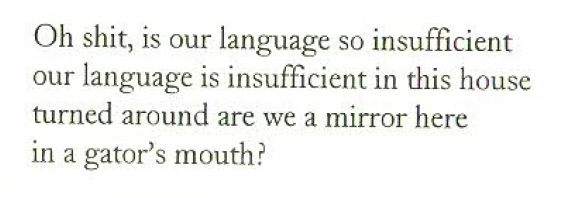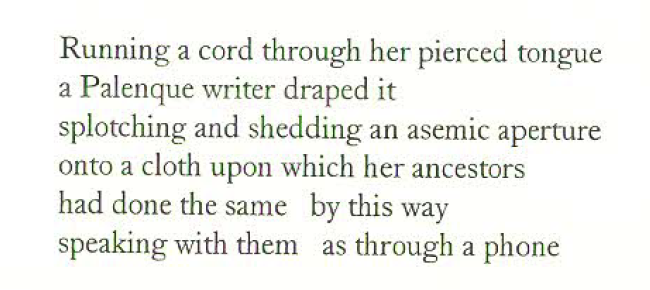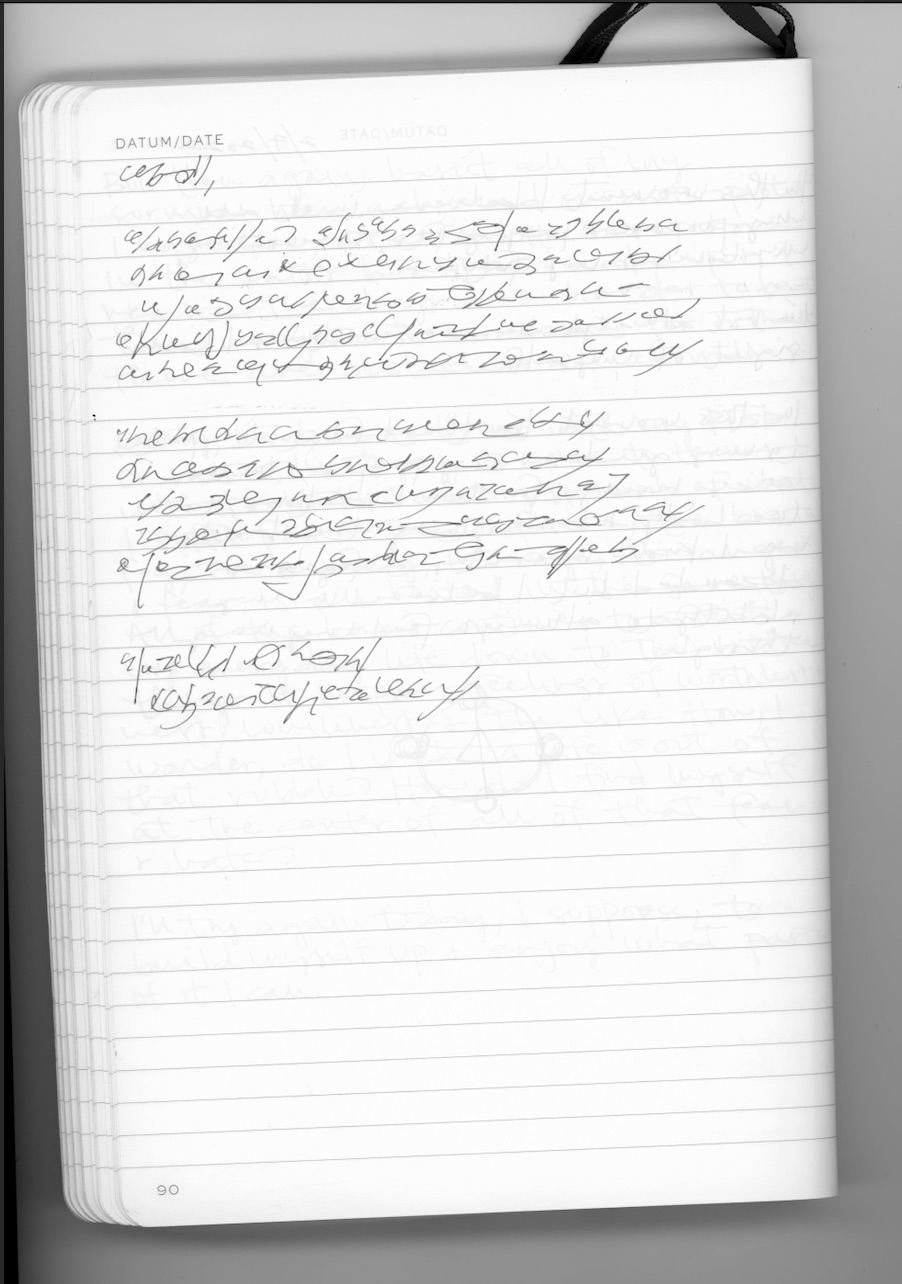Echo Punctuations, on Boundary Loot (Punch Press, 2012) by Edgar Garcia
[excerpt]
excerpt from “Obsidian Membrane,” Garcia
[revision]
Poetry, as a vocation, is the best alternative for those displaced or exiled from the traditions of slaughtered shaman… In Edgar Garcia’s chapbook, Boundary Loot (Punch Press, 2012), language becomes a psychic outpost where the ancient rites of initiation, death and prophecy articulate…
[dream]
A beach illuminated by a full moon, beyond it, black water glittering like a slab of obsidian. On the water, a lone ship floats. Blessed by the hand and the smoke of a shaman, I approach the shore quietly. Hidden against the darkness of night I enter the shadow of the sea and make my way out towards the boat. The water is warm and smells of salt and blood. I shimmy up the side of the ship using the rope of the port-side anchor. The ship is empty, abandoned entirely save for myself and a stranded jaguar.
[memory]
Alone in a wing of the Los Angeles County Museum of Art, I found myself face to face with a rounded mirror of divinatory obsidian, one of 30 objects on display at the time for the museum’s exhibition, Mixpantli: Space, Time, and the Indigenous Origins of Mexico, marking the 500th anniversary of the fall of the Aztec capital Tenochtitlan.
Hovering in a plexiglass display, flanked by pages of the Florentine Codex along the walls of the room, Mirror, 1325-1521 stopped me in my tracks. For a long while, I stared into the depths of its dark, worn surface half hoping to be overcome by some dormant vision. Instead a simple notion sprouted within me as I watched myself reflected in the stone mirror, “Oh,” I exclaimed quite naturally, aloud to no one, “it’s a mirror and a phone!”
[glossary]
The Nahuatl word, mixpantli, or “banner of clouds,” refers to the first omen of European conquest in which a crane wearing a round, obsidian mirror in the middle of its head appears before Moctezuma who sees reflected in its surface an armed horde of Spaniards arriving on horseback.
[revision]
Years later, the dream echos the reading, punctuating past-life vision—the inherited detritus of displacement settling on top of itself again and again…
[edit]
Mirrors, within many indigenous societies, functioned primarily as ritual technologies, handled by shamans and medicine women. From their earliest inceptions as bowls of water, to their later pre-colonial iterations of cut or polished stone, mirrors were tools of powerful divination…
[excerpt]
excerpt from “OMAXAC: THE CROSS TRAILS,” Garcia
[excerpt]
excerpt from “Obsidian Membrane,” Garcia
[memory]
Absentmindedly doodling, a classmate glances down at my notebook.
“What language is that?” they ask.
I reply earnestly, “You know, I really I couldn’t say.”
[notes]
![]()
![]()
scans from Gabrielle’s journal
[glossary]
asemic /eɪˈsiːmɪk/ - “having no specific semantic content”, or “without the smallest unit of meaning”
[revision]
At the time, my own poetry had taken on a similar shape—a form I was actively being pressured to abandon due to its perceived opacity. Immediately I recognized an intuitive kinship in Garcia’s poetic anatomy, a reflection not of myself but of a fanged psychic lineage…
[excerpt]
excerpt from “Apocrypha,” Garcia
[revision]
Architecturally, Boundary Loot mimics a rivers embankment in form: meandering and susceptible to floods and erosion. Across time and space, stories of life and death converge along waterways: a fish sprouts legs and finds her way out of the Gulf; a child is set afloat down the Nile and rises a prophet; disease ridden warships appear along the horizon of the Atlantic, their sails mistaken as the clouds of tribal prophecy…
[glossary]
syzygy /ˈsɪzɪdʒi/ (noun) - from Greek Συζυγία “conjunction, yoked together”; an alignment of three celestial objects, as the sun, the earth, and either the moon or a planet; any two related things, either alike or opposite.
[revision]
Read aloud, Boundary Loot elongates itself through sonic invocation allowing shapeshifting spirits to sing themselves alive through song. All manner of ritual is communicated…
[excerpt]
excerpt from “Post Face,” Garcia
[dream]
I am on stage with two women. On stage with them are structures made of woven grass. All of the structures resemble huts or another type of small, enclosed living space. The weaving on them is beautiful and well-done. Absentmindedly, I begin to weave something myself. While weaving I start to talk to the women. One woman remarks on the structure furthest from us, stage right.
“So-and-so made this one without a door. All her sadness remains in it, trapped inside. She must live like that everyday, her sadness contained within her.”
I nod, “And what a shame because this one is woven the most carefully.”
The woman nods with me in agreement.
[confession]
I am unmoored, hopelessly lost yet acutely aware of the Otherside. I have lost my language, I have lost my tongue—this is the best map I have. Where language fails dormancy, a makeshift knowledge will be erected and reinforced through the mythic spirit. The mythic spirit has many faces, many names, and many homes and its vehicle of choice is and will remain poetic. It is literature’s closest gesture to the masked ceremony and acts as a facilitator of non-human possession.
[repetition]
Years later, the dream echos the reading, punctuating past-life vision—the inherited detritus of displacement settling on top of itself again and again…
[correspondence]
Edgar,
The other night I had a dream that we were in conversation. We were placed on a map, as if we were pieces in some kind of game of conquest or stratagem, yet we were idle, remote figures. Unplayable.
Our conversation was introductory. I was telling you how I came to find your work. The story goes something like this:
“I don’t remember exactly how I came to find Boundary Loot, but I know it was during the middle of my work day. At the time I was employed as an admin in a windowless lobby where I sat with my computer visible to anyone who might walk up behind me which was the design of the office so that I could be easily surveilled.
On this day, like many, I was reading instead of working. Somehow I came across a pdf of your chapbook. Three or four pages in I had to pause to catch my breath—this was the first time I had encountered a book that I was able to understand with such immediacy. Even the form of the poems made sense to me and reflected similar intuitive impulses in my own writing, impulses that people often attempted to dissuade me from due to their perceived illegibility.
Anyways, I’ve read Boundary Loot again and again. Within its pages I can see the horizon line of the world(s) it evokes very clearly. It is the closest I have been to experiencing a sense of home through the mind of another. Thank you.”
And then I woke up.
[excerpt]
“..all I have are these poems and no kind of knowing outside of that.”1
[glyph]
symbol by Gabrielle
1 excerpt from “Brainfood” (Dereliction, 2022), Gabrielle Rucker
Gabrielle Octavia Rucker is a writer, editor and teaching artist from the Great Lakes currently living in the Gulf Coast. She is a 2020 Poetry Project Fellow, a 2016 Kimbilio Fiction Fellow, and the founder of the The Seminary of Ecstatic Poetics, a non-traditional learning space for the poetically inclined. Her debut poetry collection, Dereliction (2022) is currently available via The Song Cave.








